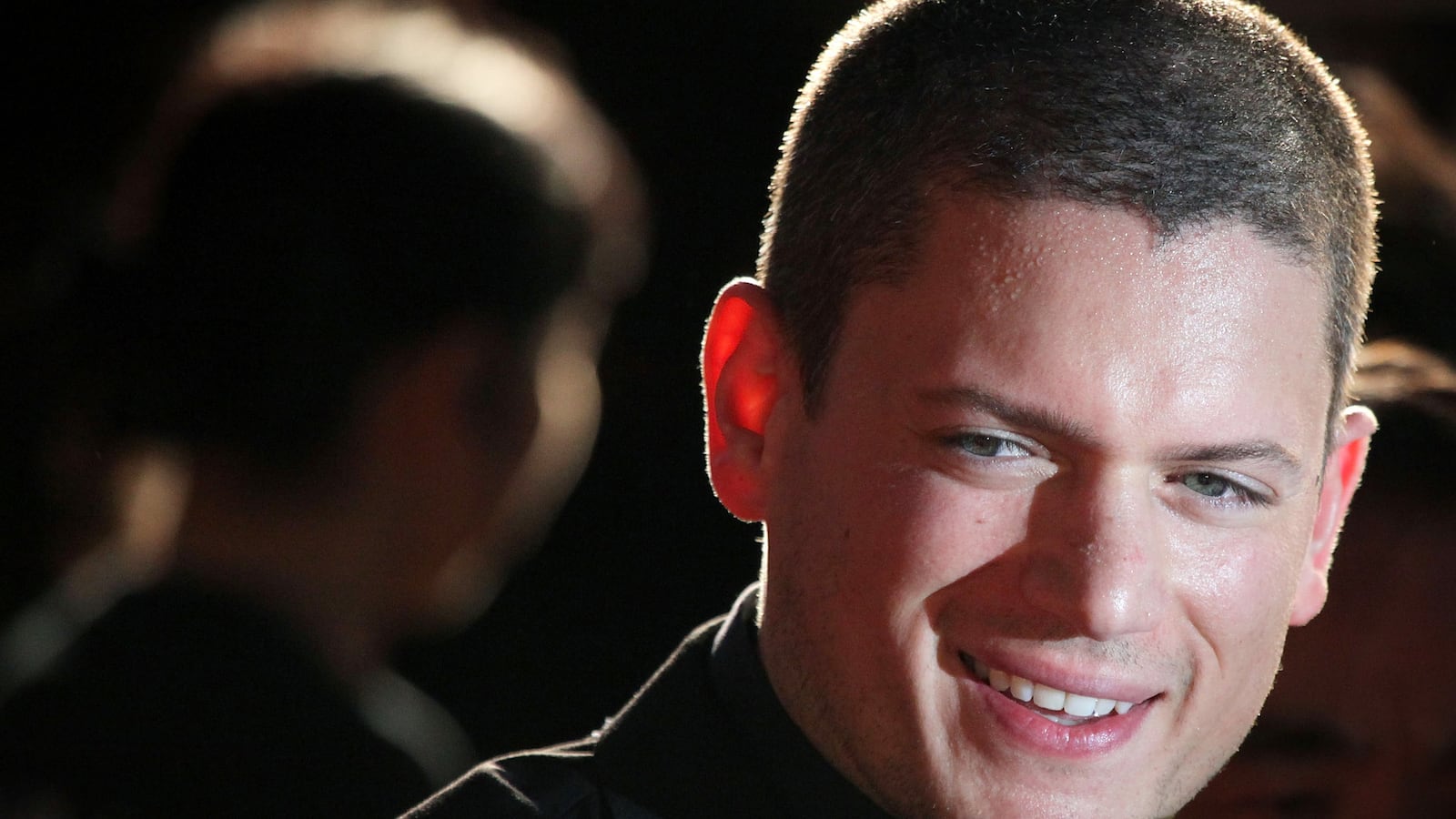Ever since Prison Break ended in 2009, Wentworth Miller has taken a step away from the spotlight. He’s done a few TV guest spots—Law & Order: Special Victims Unit and House—and decided to try his hand at writing. A lot of actors attempt a second career, but Miller’s screenplay for Stoker, which he submitted under a pseudonym, ended up on Hollywood’s annual “Black List” of best unproduced work. South Korea’s Park Chan-wook (Oldboy) signed up to direct the story, starring Nicole Kidman, Matthew Goode, and Mia Wasikowska as a troubled teen who loses her father. The horror thriller opened in limited release last weekend.

Miller hasn’t given many interviews about Stoker, but he agreed to answer our questions over email. Since he’s a writer now, we thought we’d give it a try.
Hi, Wentworth! We haven’t heard a lot from you since Prison Break. I think I read somewhere that you’re a “former actor” now. Is that true? Did you quit acting to become a screenplay writer? Or would you still like to do both?
There was a stretch in there—after Prison Break, when I was first starting to find my way as a writer—when I definitely thought I might be done with acting. But it’s still in my system. Somewhere. There’s a lot about acting—and when I say “acting” I don’t mean performing, I mean the process of producing and promoting a movie or a TV show—that doesn’t line up with who I am. But there’s also a sense of community in that process that you don’t get to tap into as a writer. It goes without saying, but writing is a solitary, isolated business (for me anyway). And I’ve got my limits as far as that goes, like anyone.
You went to Princeton, where you studied English literature. Did you always think of yourself as a writer first?
Actually, it was at Princeton that I learned to think of myself as not a writer. My freshman fall, I applied to the creative writing program and was promptly hosed. (That’s what we called getting rejected, “hosed.”) And with good reason. I don’t remember what I submitted, but I’m sure it wasn’t very good. Anyway, I continued to think of myself as “not a writer” well into my 30s. In fact, I tried to enlist a bunch of people to write Stoker for me because doing it myself didn’t seem within the realm of what was possible.
That went on for four years. Then late one night, when my DVR was tapped out, I thought, “Why don’t I sit down and try to write one scene? Who’s gonna know?” Four or five weeks later, I had the whole thing.
You submitted the first draft of Stoker under a pseudonym, Ted Foulke. Where did you come up with that name!? And why didn’t you use your real name?
“Foulke” is the name of a dorm at Princeton, and a friend of mine used to have a particularly vicious dog named “Ted.” It seemed appropriate.
I went with a pseudonym because I was worried people would see my name on the title page and jump to conclusions before they even cracked the script. Also, I didn’t want actors who might be right for the part of “Uncle Charlie”—like Matthew Goode (who I’d imagined in the role while I was writing it, actually)—I didn’t want these guys reading it, seeing my name on the cover and thinking, “Oh, he must have written this part for himself but then he wasn’t allowed to play it” (because I was only a TV star or whatever). I wanted actors to be able to imagine themselves as “Uncle Charlie” without any extra static.

Stoker takes places after the death of India’s (Wasikowska) father. Her creepy uncle (Goode) moves into her house, and there seems to be something off with her mom (Kidman). Can you talk about where you found the inspiration for the story? Did you think of it as a scary movie first, or did it evolve from a different genre in your head? It’s at times so dark that it’s difficult to watch. Where did that darkness come from?
Stoker began as a mashup of Hitchcock’s Shadow of a Doubt, The Stepfather with Terry O’Quinn, and bits and pieces of vampire mythology. I think one of the most interesting, most sympathetic interpretations of the Dracula figure is that he’s just another lonely soul schlepping through the years, looking for someone to love him, fangs and all. I think that speaks to the core of the uncle/niece dynamic in Stoker.
As to why the movie feels “dark,” on a surface level, my original screenplay wasn’t as gruesome as a Saw or a Texas Chainsaw Massacre. But you don’t go to those movies to invest in the characters. You go to see hotties getting butchered in new and creative ways. My hope with Stoker was that the audience would invest in the characters. Then, when horrible things happened, it would resonate differently. More deeply.
What’s your writing process like? Do you write in spurts? Do you have a specific place where you write? Do you have movies that you watch over and over, and study for structure? Do you revise a lot? Did you read books about screenplay writing?
Answering the above in order...
1. I like to pick out or make a soundtrack for each script and then listen to that and only that until the script’s finished. It helps me get in—and stay in—the necessary groove. The soundtrack for Stoker was The Hours by Philip Glass. I must’ve logged well over 300 plays.
2. Yes. Sometimes I’ll write for 10 hours straight. Then I won’t write for days. Depends on my mood. (And my deadline.)
3. My desk. Or sitting on a stool at the little island in my kitchen. I’ve never tried writing at a coffeehouse. I just know instinctively it’s not for me. Someone chewing with their mouth open to my right, someone watching porn on their laptop on my left ... too many distractions. Plus, I like to act out the parts as I write them, which the other patrons probably wouldn’t appreciate.
4. No. But looking back, I learned a lot from my four seasons on Prison Break. It was a relentlessly plot-driven show, and the writers were very good about making connections and tying up loose ends. I think I absorbed a great deal about story structure during that period, albeit unconsciously.
5. I revise obsessively. It’s important to me to have a clean page. I’m not a grammar god (by any stretch) but I try to keep a lookout. When I’m reading a script that’s got glaring typos, it pulls me right out of the story. It may sound cynical, but I never assume I’ve got my reader’s full attention or that they’re going to willingly slog through dense, illegible material. So I try to keep my writing as user-friendly as possible.
6. I’ve never read a book or attended a class on screenwriting. I’m not opposed to the idea, but I like what I’ve got going on naturally and want to protect that. The one question I will ask myself as I’m re-reading a script for the 60th time is, “Am I entertained? Still?” If the answer is “yes” I’ll assume other people will be too.
I know that the movie was written before we were having a national conversation about gun violence. But BuzzFeed’s Kate Aurthur has pointed out how, in the aftermath of Sandy Hook, one of the things that bothered her about watching the film was seeing a high school heroine obsessed with guns. I’ve asked other people in Hollywood about violence in films (Django Unchained, etc.), and the answer I usually get is that movies are different from reality. What are your thoughts about this?
What I can tell you is that beyond selling Fox Searchlight my original screenplay, I had nothing to do with the movie’s execution. The script was revised multiple times by multiple writers. Consequently, the end result is both mine and not mine. Which is how this business works. It’s collaborative.
In my draft, Mia Wasikowska’s character wasn’t obsessed with guns. Fearing she might be a nascent Uncle Charlie, her father had tried to insulate her from violence and violent pastimes and anything else that could potentially trigger what lay beneath the surface.
Tell me three things you learned about Nicole Kidman during the making of this movie that you didn’t know.
I can only remember meeting Nicole Kidman once, and that was while we were doing press for a movie called The Human Stain back in 2003. She was very beautiful. That’s all I’ve got.
Is it true that you’ve already written a prequel to Stoker? Is it getting made for sure? Will it star Matthew Goode? Are you writing any other films/projects?
Yes, the prequel is called Uncle Charlie and I wrote it while we were negotiating the sale of Stoker. When the studio bought Stoker they also bought the creative rights to the characters, so the prequel is theirs to make if they so choose. Will they? No idea. But naturally my hope is that the actors would reprise their roles. I think it’d be jarring for the audience otherwise.
I’ve written two more original scripts since then and I’ve also executed my first foreign remake and my first novel adaptation. I’m especially proud of those last two because they were my first official “for hire” gigs.
I’ve heard that you’re a private person, which is a hard thing to be in the TMZ 24-hour news cycle. Was that something you struggled with while you were on Prison Break? Is that one of the reasons why you took a break from acting—to get your privacy back?
No, I took a break from acting because I was burned out. And I think I needed a moment—several moments—to breathe and get my figurative house in order. And that took some realigning, some reprioritizing. Some growing up. All of which was best done in private, away from the cameras.
I have a different, more flexible definition of “privacy” today than I did when I first hit my stride as an actor. Which is helpful, because it feels like “fame” and “celebrity” have longer legs than they used to. The show’s been off the air for years but thanks to Netflix and Hulu, people are discovering Prison Break every day. Someone will come up to me and mention some moment in season 2 episode 12 that they just watched last night and I’ll have no idea what they’re talking about because we shot that seven years ago.
But my favorite is when total strangers corner me on the street and start grilling me about my career prospects. “What are you workin’ on now? You got a movie comin’ out?” And I’ll be like, “No. Actually I’m writing now.” Then I get to watch the light in their eyes flicker and die. They’re just like, “Huh.” And I’m like, “Yup. Writing.” Then they look at me like I just confessed to a crime and now they don’t know what to say. Then they start backing away.
Do you ever Google yourself?
Not for a long time. There’s nothing the Internet can tell me about myself that I don’t already know. The rest is foolishness and people killing time. (Not that I have anything against foolishness and killing time. Because I don’t. I have a healthy interest in both.)






